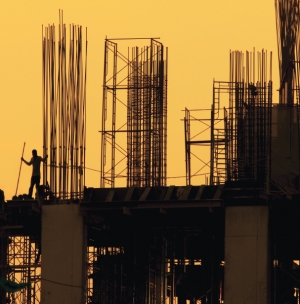South Africa plans to invest $95bn in infrastructure projects between 2012 and 2015 in order to reinvigorate the economy and create more employment, as the construction sector is famously labour intensive.
Neil Ford reports
It plans to invest $95bn in infrastructure projects between 2012 and 2015 in order to reinvigorate the economy and create more employment, as the construction sector is famously labour intensive. Malusi Gigaba, the minister of public enterprises, said: “Of paramount importance is that we cannot allow this massive investment programme to be impacted by the global economic slowdown or derailed by lack of funding.” In particular, the government is committed to investing R23bn ($2.5bn) in school infrastructure.
Pretoria has pledged to replace unsafe and poor-quality school buildings, while finance minister Pravin Gordhan has also announced that construction work on two new universities, in Mpumalanga and Northern Cape provinces, will begin this year. However, many local authorities have under-spent on construction because tenders are taking longer than anticipated to conclude. In addition, some contracts are being investigated for improper bidding behaviour. South African shopping centre developer Hyprop is looking to expand its operations in the rest of Africa. It has bought a 37.5% stake in Atterbury Africa, which holds a 47% stake in Accra Mall in Ghana and has begun construction work on the West Hills shopping centre, also in Accra.
Chief executive Pieter Prinsloo commented: “Our focus remains on investment in dominant shopping centres both locally and across Africa, while continuing to dispose of any remaining non-core assets if the opportunity arises.” The company is also spending R920m ($100m) on the redevelopment of Rosebank Mall in Johannesburg’s northern suburbs.
New construction is expected in the Coega Industrial Development Zone (IDZ), close to Port Elizabeth in the Eastern Cape. The port at the centre of the project, Ngqura, has taken off rapidly and is on course to become the country’s second biggest container port, after Durban but ahead of Cape Town. It has quickly positioned itself as an important transhipment port, particularly with regard to Angolan trade, and expansion of the terminal has already been agreed. The shelving of a planned aluminium smelter scheme has left the IDZ without an anchor tenant but significant new investment is now being made in the zone.
A truck assembly plant is currently under construction for Chinese vehicle manufacturer First Automotive Works. In addition, South African mining and engineering company DCD has set up a new subsidiary, DCD Wind Energy, to take advantage of Pretoria’s new found enthusiasm for renewable energy. The company already manufactures 50-metre rotor blades under licence from German firm Aerodyne and plans to produce 200 wind turbines a year by 2016. Coega Development Corporation (CDC) has now launched a tender for the construction of a wind tower manufacturing plant at Coega on behalf of DCD.
CDC spokesperson Ayanda Vilakazi said: “By the second quarter of the new financial year, the Coega IDZ will have commenced with construction to the approximate value of R700m ($76m), with the current value of construction projects estimated at R350m ($38m).
This means a great amount of opportunity for local businesses and in turn, significant job creation prospects.” The government is offering substantial financial incentives to encourage investment in the zone, largely because the Eastern Cape has missed out on much of the economic growth that has benefited other cities in the country over the past decade and has one of the highest unemployment rates in South Africa.
– Doing business in Africa




Comment here
You must be logged in to post a comment.